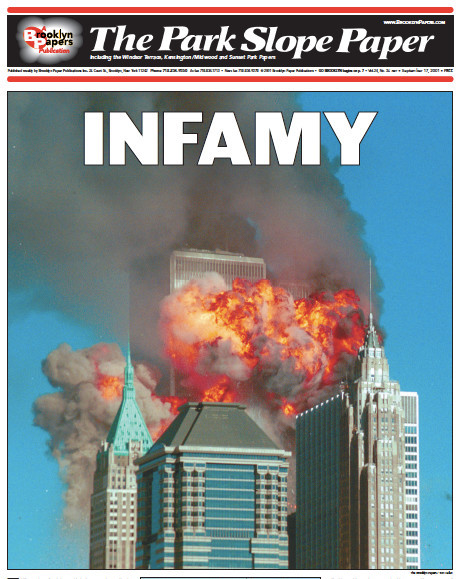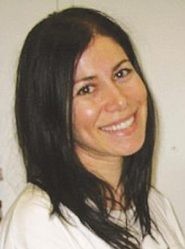9/11 merges into Rosh Hashanah
This probably won’t be true for the next generation, and perhaps it’s only the case for New Yorkers or many of us who called New York home for a good chunk of our lives, but remembering 9/11 has become part of the pre-Rosh Hashanah moment. Like apple and honey cake baking, like Selichot, like shofar blowing, a sacred pause to remember back to that day of 9/11 seems to be part of the Rosh Hashanah fabric.
At the time, I was living in Israel. But I had just relocated there the previous year, after attending college, graduate school and having my first jobs in New York City. Formative young adult years.
When the tragic news unfolded, I felt somewhat displaced and confused. Terrorism was my Israeli life, not my American one.
I was so connected to New York, yet I wasn’t there. I experienced this indelibly American, and even more so, New York moment, via screen, an ocean away. It was a very strange long distance impactful tragedy.
I did not experience the literal displacement many New Yorkers went through that day, but a psychic displacement and, strangely enough, at the same time, an affinity.
Terrorism.
I didn’t want my two worlds, my Israel and my America, to merge, to collide. The safety, or at least the illusion of it, of Israel being the dangerous place, but always having America a the safe place, was a comfort, a security.
On 9/11 that was shattered.
On a personal level, this doesn’t even make the cut of an irrelevant footnote in comparison to those who were in the traumatic path of 9/11, not to speak of the actual sufferers, survivors and, achingly, those who lost loved ones on that fateful day.
But even without very personal links, it was another humanly constructed veneer or layer that was stripped bare that day, exposing vulnerability to a whole new level, a whole other scale.
I recall 9/11 taking place very close to Rosh Hashanah. I was young and the intensity of the season amplified by the tragedy took its toll.
That year, Rosh Hashanah arrived with many reeling question marks about the whereabouts of some social acquaintances of mine.
Later that year, when I met my sister Shana in New York and we went on what felt like a sacred pilgrimage of sorts, to Ground Zero, I recall still seeing a worn paper sign here and there, pleading for information on the whereabouts of a loved one.
Even by Yom Kippur time, a fortnight or so later, I recall still connecting the alphabetical viddui prayer with the haunted alphabetical lists of those killed or being searched for, that were circulating.
That year, Rosh Hashanah 2001, merged with 9/11, and to this day, a piece of that is carries over to Rosh Hashanah each year.
Remembering Abraham Zelmanowitz’s heroism, a computer programmer for Empire Blue Cross and Blue Shield, on the 27th floor of Tower 1, who instead of rushing down the stairwell to save himself chose to stay behind and remain to the bitter end by the side of his colleague, Ed Beyea, a wheelchair bound quadriplegic.
Learning of the heroism of Rick Rescorla, director of security for Morgan Stanley who, upon seeing the North Tower flames, not only ignored the message he received to have Morgan Stanley stay put, and instead made the call to evacuate the entire firm — a group of people numbering 2,700 — which he did successfully, but when re-entering the building against the advice of bystanders who desperately prodded him to remain with them outside and not re-enter the inferno, his reply was, “As soon as I make sure everyone else is out.” He was last seen heading upward in the South Tower, before it collapsed. He saved almost 3,000 lives.
This year a Facebook friend posted: “The line all the way out the door at Ohab Zedek (on the Upper West side) on 9/11 to bentch gomel (give thanks for rescue) was one of the most powerful lines I’ve ever seen. Only second to the line to give blood, the very next day.”
When you watch The Definitive Live News Montage of the events of 9/11 unfolding, a sequence of evolving raw bits of news from various channels and different human voices, piecemeal, literally piecing the story together, in horror, the human vulnerability factor is simply striking.
We are clueless.
We really don’t know what the next moment brings, let alone the next year. Life is so tenuous. Rosh Hashanah simulates the experience for us each year.
On 9/11, erev Rosh Hashanah in 2001, this vulnerability, this tenuousness, on some level was not a theoretical simulation; it was felt and experienced in actual time.
Of course, the holiday of Rosh Hashanah greets us with sweetness, with hope, with an optimism for new beginnings.
On some level, though, for my generation and older, the juxtaposition of 9/11 and the introspection of Rosh Hashanah will always go hand in hand.
But returning back to its motif of sweetness, may this Rosh Hashanah be the harbinger of much sweetness to come for you and your loved ones and for the entire House of Israel as well as the entire world.
Upon the dawn of this year, shana tova u-metukah!.
Copyright Intermountain Jewish News

 44.0°,
Mostly Cloudy
44.0°,
Mostly Cloudy 







